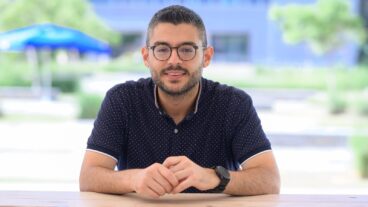Nabeel Abu Nassar: The device is a tool that can help Americans learn everything about how the brain works.Nabeel Abu Nassar, an Israeli Arab from Nazareth, is helping to change the face of American brain research. His company NAN Instruments is supplying American researchers with a computer controlled mechanical device that helps them uncover all the secrets of the brain – from how to treat Parkinson’s disease to overcoming addiction.
The nature of brainwork understandably demands high precision tools – and as researchers delve deeper into the brain they are finding that they need to measure many more processes simultaneously. NAN’s microelectrodes allow researchers and doctors to maneuver and insert their examining electrodes in a different way into the brain, thereby increasing the flexibility of a procedure they were already used to.
“Nabeel has done a very nice job of listening to researchers, including myself, by designing a drive that gives insights into how cells interact – an important factor in understanding their function,” said Prof. Joshua Gold, from the University of Pennsylvania, who studies how the brain collects information from our senses to guide behavior.
Robert Desimone, a researcher for the National Institute of Health, is planning to use NAN’s microelctrodes in his lab to help him understand disorders of perception, attention, and memory disorders which frequently accompany major mental diseases in America.
The proliferation in the U.S. of NAN technology is thanks to Plexon, a Texas-based neurotechnology company which officially paired up with NAN in July.
“Plexon’s system completes mine,” Abu Nassar told ISRAEL21c from his home in Nazareth. “With my device, I insert the electrode and collect activity, while they filter and amplify the signals we collect.”
Sherman Wiebe, director of sales and marketing at Plexon, explains that by working with NAN, he can give his existing and future research customers better tools to do their jobs.
Most brain research being done is still at a very basic stage, and it was at that basic stage in life, where Abu Nassar first learned the mechanics behind engineering. At his father’s business – Abu Nassar Workshop in Haifa – he and his siblings helped repair agricultural machinery and farm equipment for neighboring kibbutzim and farms.
While some mature students go to university late for fear of missing the boat, Abu Nassar caught the tractor. Admittedly, his interest for engineering was a direct result of the hands-on mechanical experience he got at his father’s workshop, where he built and repaired machinery that had broken or missing parts.
After working for seven years, Nabeel took a difficult prep exam for entrance to university and was accepted immediately into the most desired faculty and subject – Electrical Engineering at the prestigious Israeli university, the Technion in Haifa.
By that time, according to Abu Nassar, the Arab population had already comprised a considerable part of the student body at the school. “They treated me like everyone else at the Technion. I had very good friends there, even religious Jews,” he said. “I didn’t look at people to check if he was a Jew or not – if he was good company that’s all I wanted.”
It was in Haifa where Abu Nassar would meet future long-term friend and mentor Imad Younis, owner and founder of a biotech equipment company Alpha Omega. “At one point we even shared an apartment together,” he said.
After graduating in 1990, Abu Nassar went back to his father’s workshop for a few years and in that time he met and married his wife Suraya. He continued meeting with Younis weekly and in 1997 they both agreed it would be a good idea for Abu Nassar to work at Alpha Omega.
“It was the first time I worked for someone as an employee, and I set high standards for myself because I wanted to succeed. I knew that if I left the family business I would have distinguish myself, and for this reason especially I wanted to succeed and prove myself,” he said.
When Abu Nassar’s family continued to grow, he decided to go into business for himself. And two years ago, he opened his own company, NAN. During the first few quiet months he would go to his office like any other working person even though he had no clients.
“I would just sit there and think,” he said.
One day Abu Nassar and his younger brother Maroon, a lawyer, were having their regular coffee-brainstorming session when they realized the mechanical principles behind the device that would put NAN on the map.
The future device would allow researchers and doctors to maneuver and insert their examining electrodes in a different way into the brain, thereby increasing the flexibility of a procedure they were already used to.
“My brother helped give me ideas on how to make the device more stable. He also worked at the family business so he understood mechanics like me,” said Abu Nassar.
Less than two years later, Abu Nassar is happily tallying a 40 percent market share from the microelectrode manipulator market, and his long-range business plan is to sell units to hospitals in America and Europe for surgery.
“The device is a tool that can help Americans learn everything about how the brain works: how muscles work; how memories are formed; how eyes work. This tool can really tell us about everything,” said Abu Nassar. “A human is brain, everything one does comes from the brain.”












